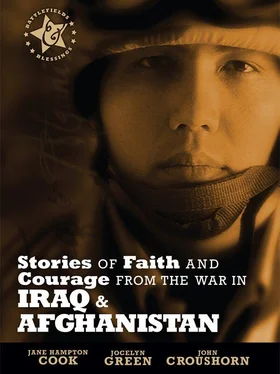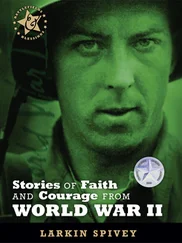Again, the marine nodded. “You’re welcome,” he managed after a long pause. Then he turned, climbed back in his truck, and looked back one last time at the man.
“I pray for you… for Marines!” shouted the man over the din of the motor.
Then he lifted the cross and declared, “Freedom!”
Marines, no matter how tedious your tasks may seem, you have brought freedom to a people long oppressed, and their gratitude to you will last for generations. Perhaps you will never know exactly how it is that you have changed the lives of these people, but you have and continue to do so every day, with every flight hour, every shift, every turned bolt, every floor swept, every report printed. Few else can claim the same.
Prayer:
Eternal God, give us courage to labor as your servant people, healing broken people and rebuilding devastated communities, providing safety for the weak and hope to those who have none. Position us among the poor with words and deeds of freedom.
“A generous man will himself be blessed, for he shares his food with the poor.” (Proverbs 22:9)
January 31
WHEN HE WAKES UP
Maj. Janis Dashner, Chaplain, United States Air Force
After a convoy on a reconnaissance mission was ambushed, the injured soldiers came to the emergency medical unit in Baghdad where Dashner was serving as an Air Force chaplain. Chaplain Janis Dashner wrote in her journal about the night of December 4, 2003: “Dr. K did all he could to save Bruce’s leg but it was too badly damaged. Only a few hours have passed and he is already on the plane heading for Germany.”
Bruce’s platoon Sergeant, Tommy, was also injured. He had several shrapnel wounds in his legs plus three gunshot wounds one in his upper arm and two in his chest. Unlike Bruce, he was stable enough to wait until the next day for an airlift to the United States military hospital in Germany. Dashner quickly realized that Tommy was more concerned about Bruce than himself.
“Tommy is extremely worried about Bruce’s ability to cope with the loss of his leg. Bruce was orphaned at age seven, grew up in foster homes, doesn’t have a girl friend, and makes friends with great difficulty. He considers the Army unit he is assigned to as his family. Tommy told me that Bruce begged him while they were on the side of the road not to let ‘them’ which is actually ‘us’ take his leg off. He said he would rather die than to have that happen,” she wrote.
Dashner waited all night with Tommy. When Dr. K came and talked to him about his own injuries, Tommy made an interesting request.
“Now Tommy is in a race to get to Germany before Bruce wakes up too much. He wants to be with him when he has to learn this news,” Dashner wrote.
The medical team called the hospital in Germany. The staff there made sure Tommy would occupy the space next to Bruce.
The Sergeant’s concern for Bruce revealed true servant leadership. Despite suffering from three gunshot wounds, Tommy wanted to continue to be a leader and friend to Bruce.
Four years later, Dashner watched the State of the Union Address on TV. When President George W. Bush introduced a young soldier sitting with Mrs. Bush in the gallery, Dashner began to cry.
“The young, tall, healthy Tommy stood up to acknowledge the applause. My tears are ones of joy,” Dashner journaled that night.
Army Sergeant Tommy Rieman of Independence, Kentucky, was awarded the Silver Star for his bravery in Iraq in December 2003.
Prayer:
Father, thank you for using friendship in such a powerful way. Open my eyes to the needs of my friends. May I be a friend who sticks closer to a brother.
“A man of many companions may come to ruin, but there is a friend who sticks closer than a brother.” (Proverbs 18:24)
February 1
HOPE OF SPRING
Maj. Janis Dashner, Chaplain, United States Air Force
“The news tells us of the cold weather that is coming over the United States. We on the other hand are having some spring time experiences. After all the rain from last week, we have grass! It is growing in and around cracks and in between the C wire. It is soft bright green grass. I know it is soft because I stopped to pet it, it’s a simple pleasure,” Chaplain Janis Dashner wrote in her journal on December 12, 2003.
The moment reminded her of Song of Solomon 2:11–12 “For lo, the winter is past, the rain is over and gone. The flowers appear on the earth.” And in this case, grass.
“I’m sure our winter isn’t over just yet. But it is nice to have a preview of the spring to come. I’m sure the winter for the Iraqi people isn’t over either… but spring will come,” she continued.
Dashner served at a Mobile Aeromedical Staging Facility in Baghdad. The television show, M*A*S*H , depicted doctors and nurses rushing to helicopters to retrieve wounded patients. MASFs are a modern version but with a key difference. Military medical staff stabilize wounded patients at a MASF and then load them onto a plane that takes them to a hospital. The MASF is mobile and usually used at the beginning of a war. When the situation is stabilized, a Contingency Aeromedical Staging Facility takes over. Dashner witnessed this transformation.
“The MASF has grown into a CASF which is a larger facility with the capability to hold patients for longer periods of time. This is the place where patients are ‘collected’ from various treatment areas, field hospitals, and surgical hospitals; they stay with us until airlift is ready to fly them, usually to Germany,” she wrote in her journal, noting that loading patients onto planes is often heavy work.
And while spring had not fully come to the people of Iraq, the transformation of the MASF to a CASF was a hopeful indicator of a more stable Iraq, a little green grass growing under the barbed wire. The day after Dashner wrote about the hopeful signs of spring, United States soldiers captured Sadaam Hussein. Hope was on the horizon.
Prayer:
Father, thank you for the hopeful signs you give of new life to come, of the change of seasons that electrify the earth. I pray for continued hope for the people of Iraq.
“See! The winter is past; the rains are over and gone. Flowers appear on the earth; the season of singing has come, the cooing of doves is heard in our land.” (Song of Solomon 2:11–12)
February 2
MAY I SEE A MIRROR?
Maj. Janis Dashner, Chaplain, United States Air Force
Four patients wounded from the same building explosion arrived at the CASF where Chaplain Janis Dashner served. One of them was named Chuck. He had lost one eye and had extensive shrapnel facial wounds. The morphine left him confused.
“While in the convoy from the hospital in the Green Zone to us he got disoriented. He shared that ride with a soldier from Pakistan. Hearing the foreign language confused Chuck; I don’t think he realized he was in United States hands,” she wrote on December 12, 2003.
The medical staff asked Dashner to watch him.
“When I took his hand to introduce myself, he held on and didn’t let go. His ‘good’ eye was swollen shut and he couldn’t see. My ministry last night was to talk with Chuck, to calm him down, to wash his arms and legs off so we could see what wounds needed dressings and what were just scratches from crawling through the debris,” she wrote, noting he soon fell asleep.
Chuck woke up two hours later.
“I noticed him as he reached up to touch his face. He was feeling the stitches that had been put in place to piece together his face. Then he asked the question I don’t think any of us expected. Chuck asked if he could have a mirror. As his nurse found one for him, I told him what he was going to see. When he looked at himself, through one blurred eye, he asked me. ‘Do you think my children will kiss me when they see me?’”
Читать дальше












